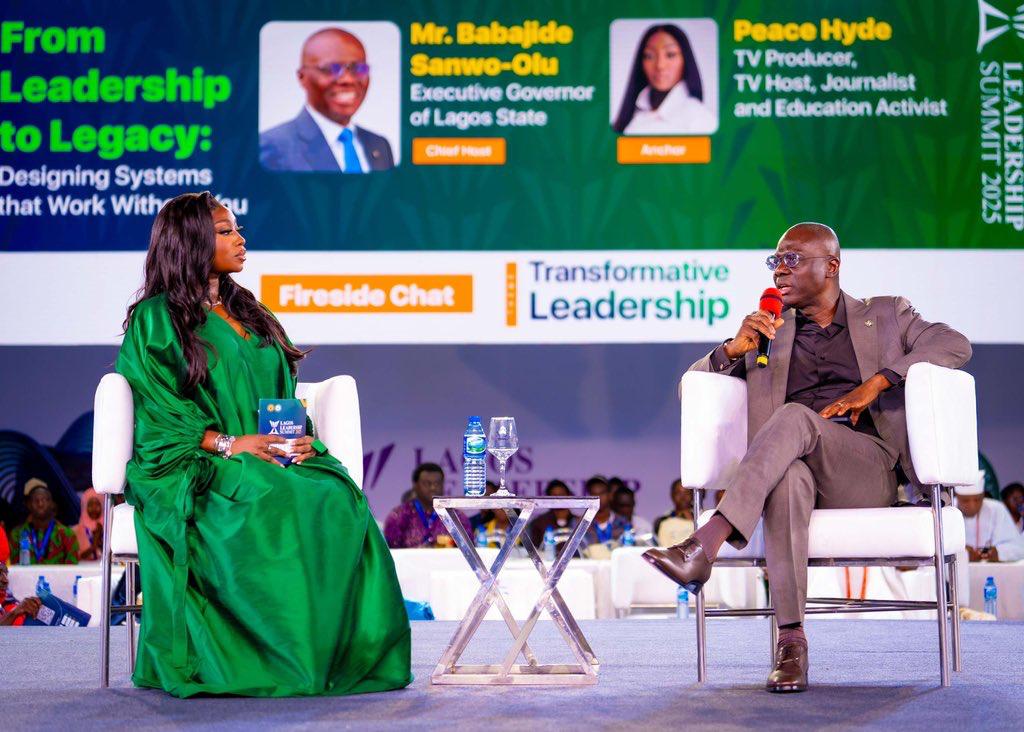•Says Loyalty is Pivotal in Public Service
The Lagos State Governor, Babajide Sanwo-Olu, has credited President Bola Ahmed Tinubu for playing a pivotal role in shaping his journey to public service stating that loyalty, dedication, and competence in small tasks are often the building blocks for opportunities in governance.
Speaking at the Lagos Leadership Summit, organised by the Lateef Jakande Leadership Academy (LJLA), at Konga Place, Lekki, Sanwo-Olu shared his personal story of growth in public service.
The event themed “Transformative Leadership: Developing Responsive, Adaptive and Inclusive Models,” gathered young leaders, traditional rulers, policymakers, and former public office holders to explore the future of leadership in Nigeria.
Prior to his entry into public service in 2002 as Special Adviser on Economic Matters, Sanwo-Olu noted that he was an investment banker.
“I was appointed to serve as Special Adviser when former Governor, now President Tinubu, started laying the groundwork for transforming Lagos into a modern city. For me, this marked the beginning of learning from Tinubu’s transformative and pragmatic approach to leadership,” Sanwo-Olu said.
He described how Tinubu’s mentorship expanded his capacity by entrusting him with diverse portfolios — from transportation to environment, public safety to education — each role presenting challenges that helped refine his leadership instincts.
“I gave each role my all, whether it was boosting revenue in public agencies or changing mindsets in the environment sector. I wasn’t thinking about where it would lead — I simply focused on delivering value.”

After Tinubu’s tenure, Sanwo-Olu continued to serve under his successor, Governor Babatunde Fashola, in what was considered a less glamorous ministry. Still, he used the opportunity to demonstrate impact-driven leadership.
“It was believed to be a ‘dry land,’ but it ended up being a defining phase for me. It was a chance to transform human capital and test how far I could go with limited resources,” he recalled.
Sanwo-Olu emphasized the importance of persistence and self-development, advising youths not to be disheartened by setbacks or delayed expectations.
“There were times when things didn’t go the way I hoped. But those seasons became opportunities to reappraise myself, improve my skills, and come back stronger. When you’re given a small role, do it with excellence — the world is watching,” he said.
He urged young Nigerians to embrace lifelong learning and personal evolution, stressing that adaptability and resilience are critical in leadership.
“It’s not how many times you fall, but how often you rise. Learn, unlearn, and relearn. Rejections and disappointments are not endpoints — they are setups for greater possibilities.”
Also speaking at the summit, former Lagos State Governor and Minister for Works and Housing, Babatunde Raji Fashola, underscored the importance of inclusive leadership.
In his presentation titled “The Inclusion Imperative: Why No One Wins When Leadership Leaves People Behind,” Fashola cited constitutional principles and practical strategies to ensure all citizens feel represented.
“Inclusion isn’t just about ticking boxes. It’s about creating spaces where people believe they belong. Platforms like this summit — where dialogue happens across generations and demographics — are key to deepening inclusion.”
Other notable participants include; Olu of Warri, Ogiame Atuwatse III, Emir of Zazzau, Amb. Ahmed Nuhu Bamali, and Oniru of Iru Kingdom, Oba Omogbolahan Lawal, who engaged in dialogue on youth empowerment, national unity, and cultural leadership.
Executive Secretary of LJLA, Ayisat Agbaje-Okunade, noted that the summit’s large turnout reflected the urgent desire of young Nigerians to contribute meaningfully to nation-building.
“This forum is about bridging generational gaps. Progress doesn’t happen in isolation — it’s built by communities that dare to collaborate. That’s what this summit represents,” she said.


